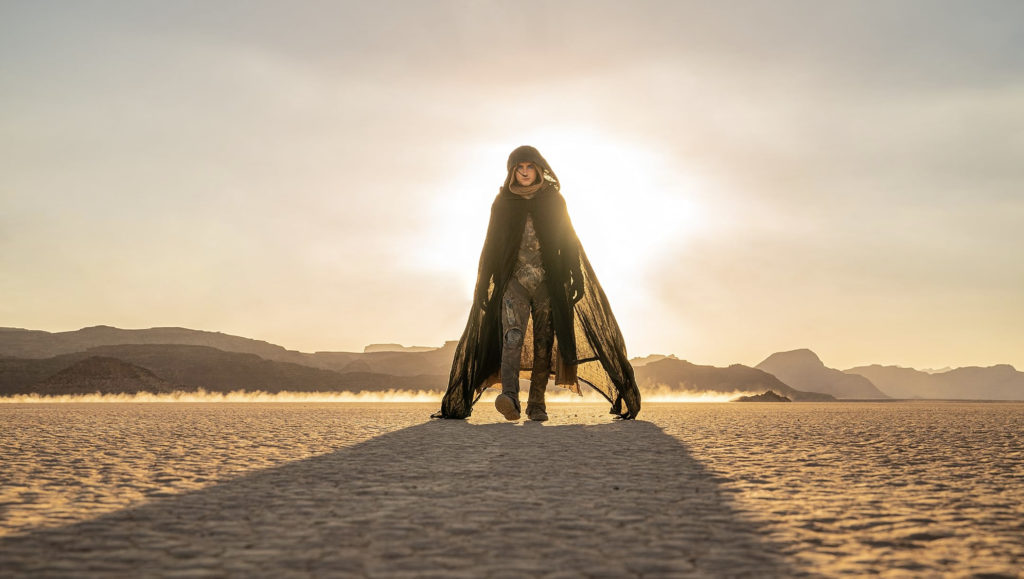What’s not to like about “Dune: Part II”?
The sequel to Denis Villeneuve’s 2021 box office hit features special effects that would have amazed us only a few years ago, set in a complicated, not-so-brave world created by the visionary late science fiction writer Frank Herbert, author of the Dune novels. The story weaves a tapestry of themes and references to history, religion, technology, political intrigue, ecology, and even, ironically, mystical powers.
It is sometimes alleged that popular culture has a tendency toward the simplest and away from the complicated, but “Dune,” with its generations of fans, is a counterexample.
Herbert himself admitted allusions to Arthurian tales in his personal “Dune” universe. But others include the feudal civilization of the Holy Roman Empire, colonialism as it played out in Islamic countries (think Lawrence of Arabia), a world economy dependent on unevenly distributed energy sources, a religious caste of women with unusual powers who represent a kind of deep state power behind the thrones of the great families that, in unceasing rivalry, play games with the balance of cosmic power.
Like the first installment, this year’s sequel is mostly set in Arrakis, a desert planet rich with a precious natural resource: “Spice” not only powers space travel but can also open human consciousness to knowledge of the past and future. The planet’s indigenous have taken refuge from their colonizing oppressors in its cliffs and caves, while finding ways to survive without virtually any water.
The movie plays down some of the Islamic references (the book talked about jihad and mujahidin, but moviegoers probably have enough uncomfortable memories of Afghanistan) but Paul Atreides (played by Timothée Chalamet) is still recognized as the “Mahdi,” the same word for the messianic savior traditionally awaited by Shiite Muslims.
Just before the sequel starts, the dukedom of Arrakis has been taken away from the vicious House Harkonnen by the galactic emperor and given to Paul’s father, Leto Atreides. The move is revealed as a trap set by the emperor for the Atreides family, whom he fears as rivals. When the empire attacks Arrakis with troops disguised as Harkonnen soldiers, Leto is killed while his wife, Jessica, and their son, Paul, barely escape.
Jessica, who belongs to a secretive caste of women with secret powers known as the Bene Gesserit, and Paul hide among the Fremen, the Bedouins of Arrakis, who live in the desert and who even manage, to a degree, the enormous sandworms that are the source of the precious spice.
There are signs that Paul is the Fremen’s long-awaited messiah figure, and when they realize it, set out to train him in all things Fremen. Along the way, Paul gets to know Chani, a Fremen woman warrior (played by singer-actress Zendaya), who gradually falls in love with him.

A guerrilla war develops between the Fremen and the Harkonnen forces. Paul’s abilities grow while his mother moves to another part of the planet to exercise some spiritual leadership and encourage Paul to accept his fate as the messiah.
But Villeneuve made some telling adjustments to the original “Dune” story, like giving Chani a greater role. In the book she is devoted to Paul and is the mother of his son, but in the movie is a Fremen leader who opposes some of the ideas of Paul and his mother. She detests Paul’s veneration as Mahdi by some of her fellow Fremen, whom she dismisses as “fundamentalists,” and considers religious hope as a form of enslavement.
Herbert was against the exaltation and divinization of leaders, which he said was “painful,” but the metamorphosis that happens to Paul in the series of books is a much more complex and grotesque process than the stereotypical distrust of religion expressed in “Dune: Part II.”
With increasing boldness, many “influencers” on social media have accepted as axiomatic that religion is not a part of the solution to the world’s problems. “Fundamentalism” is the new enemy of human progress. While Chani doesn’t say so explicitly, her attitude resembles the old canard that religion is the opiate of the people. “Hope” should not be based on something that transcends our individual experience, and we should save ourselves and not wait for a savior. All the altruism that religion can inspire is discounted because it is manipulation.
Herbert said that any comparison to Christ and Christian beliefs was out of bounds in “Dune.” Nevertheless, his depictions of Alia, Paul’s weird sister, and of the Bene Gesserit sisters illustrate the cynical use of faith to political ends.
If religion is just about power relationships, however, it is not about redemption. “Dune II” lightly mocks the sensibility of the Fremen warriors, their gullibility, and their straining to believe. Villeneuve has said that he did not think anyone could watch this installment and still have admiration for Paul Atreides or see him as a hero. Perhaps he is contemplating moving on with the story, and has read the ugly transformations ahead for Paul, but he seems to forget that there is really no alternative to Paul’s “Mahdi-fication.” The empire is corrupt, the Harkonnens are barbaric, and the possibility of the Fremen’s “greening” of Arrakis without achieving power is negligible.
In other words, the “Dune” films don’t seem to want to acknowledge the obvious: that in (most likely) naming the titular family after a clan in Greek mythology, Herbert probably conceived of his saga as a tragedy. The House of Atreus was no city on a hill, but rather a family whose members committed fratricide, adultery, and child sacrifice.
Fate is an inexorable nemesis for the Atreides. No Brady Bunch, barrel of laughs kind of story. Perhaps Herbert was signaling that to us with the classical name.

